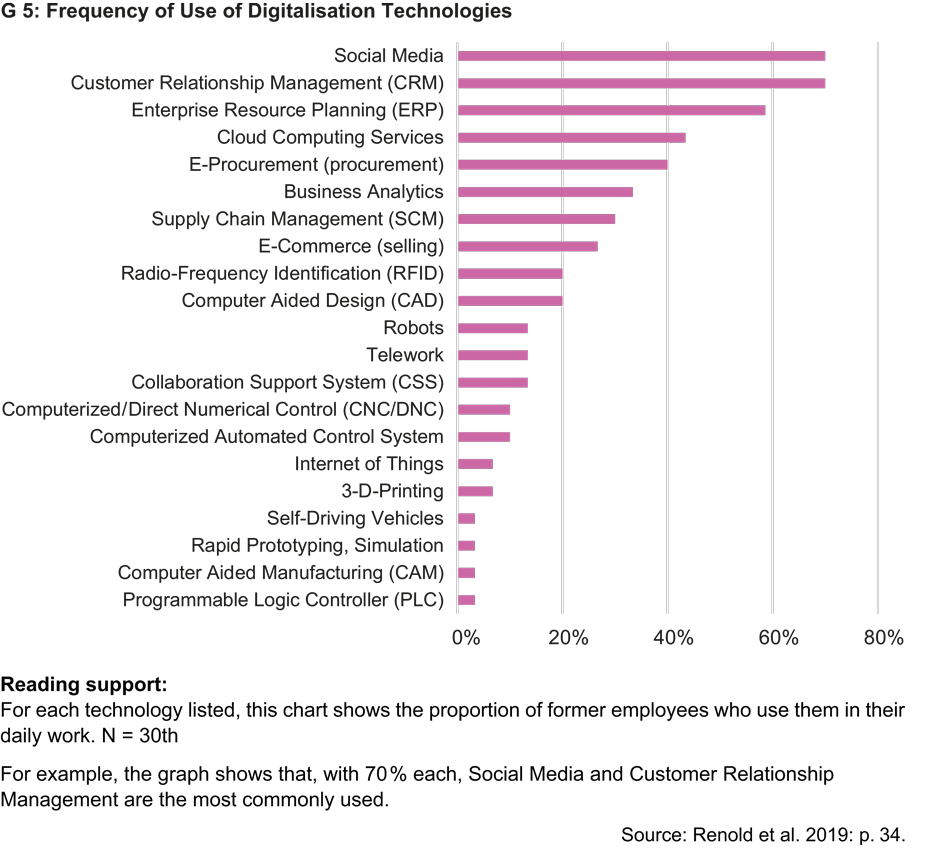Digitalisation Is Bringing Significant Changes to Everyday Working Life
- KOF Bulletin
- Vocational Education and Training
New technologies pose a challenge not only to companies but also to vocational training. A survey among graduate business economists, (higher technical colleges, HF), has shown that digitalisation has significantly changed their everyday working life in a short period of time.
The buzzword ‘digitalisation’ is on everybody’s lips. According to its scientific definition, digital-isation is the conversion to digital processes and products by means of information and com-munication technologies (see for instance Arvanitis et al. 2017). In the period from 2014 to 2018, KOF’s Education Systems research division conducted annual surveys among students following a “graduate business economist (higher technical college, HF)” course. In 2018, the first survey of graduates was carried out, which included the impact of digitalisation on every-day working life.
According to the results, technical developments have significantly changed the respondents’ daily working life in a short period of time. Although, on average, they considered themselves sufficiently qualified, the majority stated that they believed further training or advanced training would be necessary due to digitalisation. Ideally, aside from companies taking digitalisation into account as a driving force, education courses should include digitalisation as a central theme in their curricula.
Major changes in a short period of time
Based on their analysis, the researchers wanted to find out whether and how digitalisation has changed the respondents’ jobs over a period of three years. On a scale from one to five, the resulting average of 3.2 indicates that changes are in the medium range. However, since the question relates to a very short period of time, the results also show that jobs are changing fast and to a significant extent.
Consequently, the question arises how well qualified respondents believe they are to deal with these changes. At an average 3.8, they generally believe that they are sufficiently quali-fied. However, interestingly, 61% of the respondents state that further training or advanced training will become necessary due to the digital transformation. This percentage is generally independent of the question how well qualified respondents feel for dealing with the future.
Work processes are becoming more efficient
The respondents were also asked to describe how digitalisation has changed their everyday working life. This refers specifically to higher efficiency of work processes, for instance through process optimisation and automation or the elimination of manual work stages. In this context, respondents also frequently mentioned digitalisation of data pools, reporting and con-trolling. On top of this, they referred to additional methods and tools in the fields of internal and external communication.
Since these descriptions are of a more general nature, the respondents were also given a mul-tiple-choice list with prevalent technologies (Arvanitis, et al. 2017). Graph 5 shows the per-centage of respondents that use a specific technology. Communication via social media (social media) was the most frequent technology at 70%. Further technologies relevant to in-ternal and external exchanges of information include the electronic procurement of goods and services (e-procurement at 40%) and the electronic sale of goods and services (e-commerce at 27%).
Among the information collection and processing technologies, customer relationship man-agement is the most prevalent at 70%. At 59%, enterprise resource planning (ERP) is in third place. Cloud computing services are relevant among 43% of the respondents. Less frequent are computer-aided statistical processes (business analytics, 33%) and procurement recording software (supply chain management, 30%). While the use of these technologies for the opti-misation of internal and external interfaces is relatively frequent, digitalisation of production processes is less relevant among the respondents.
A detailed version of this article will be published in the KOF Analyses of 13 June.
Literature:
Arvanitis, S., G. Grote, A. Spescha, T. Wäfler, und M. Wörter (2017): Digitalisierung in der Schweizer Wirtschaft: Ergebnisse der Umfrage 2016. Eine Teilauswertung im Auftrag des SBFI. KOF Studien 93, Juni 2017. Zürich: KOF, ETH Zürich. https://www.research-collection.ethz.ch/handle/20.500.11850/239703
Renold, U., T. Bolli, K. Maldonado-Mariscal, L. Rageth, und A. Sritharan (2019): Fünfter Bericht zur Evaluation des Rahmenlehrplans für den Bildungsgang «dipl. Betriebswirtschafter/in HF»: Befragung von Ehemaligen und vertiefte Betrachtung der Digitalisierung. KOF Studien 130, Mai 2019, Zürich: KOF, ETH Zürich. https://www.research-collection.ethz.ch/handle/20.500.11850/342374
Contact
No database information available
